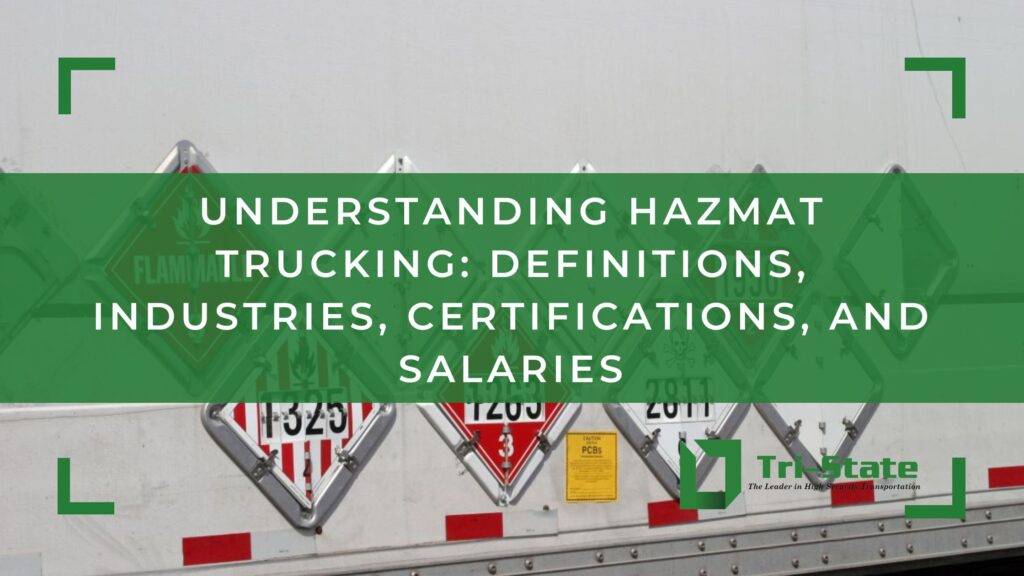Guide to Hazmat Trucking: Definitions, Industries, Certifications, and Salaries

Contrary to popular belief, there are various types of trucking jobs drivers can pursue. Common examples include dry van, flatbed, tanker, reefer, auto hauler, and long-haul (OTR) truckers. Another type of trucking job is transporting hazardous materials, and this professional needs to be more specialized than a conventional trucker.
What is hazmat trucking? And what are the hazardous material trucking requirements? We cover everything in our latest post to help you determine if a hazmat trucking career is right for you. Read on to learn more:
What is Considered Hazardous Material?
According to the U.S. Department of Transportation and Federal Motor Carrier Safety Administration, hazardous materials are placed in nine hazard classes:
- Class 1, Explosives: Examples include fireworks, ammunition and detonators.
- Class 2, Gases: Examples include propane, oxygen and compressed air.
- Class 3, Flammable Liquids: Examples include gasoline, diesel fuel and ethanol.
- Class 4, Flammable Solids: Examples include matches, magnesium and sulfur.
- Class 5, Oxidizing Substances: Examples include hydrogen peroxide and ammonium nitrate.
- Class 6, Toxic and Infectious Substances: Examples include pesticides, medical waste and biohazards.
- Class 7, Radioactive Materials: Examples include uranium and medical isotopes.
- Class 8, Corrosives: Examples include battery acid, sulfuric acid and hydrochloric acid.
- Class 9, Other Dangerous Goods: Examples include lithium batteries, asbestos and dry ice.
What Industries Deal with Hazardous Materials?
From chemical manufacturing to waste management, you might be surprised to learn just how many industries deal with hazardous materials. Here’s a brief overview of popular industries that regularly manage hazardous materials, and the types of materials they encounter:
- Chemical Manufacturing: From corrosive materials like sulfuric acid to flammable solvents, toxic pesticides and pharmaceutical chemicals, the chemical manufacturing industry and its distribution channels regularly transport hazmat materials.
- Petroleum and Energy: Crude oils, fuels, propane and compressed oxygen are just some of the hazardous materials truckers transport while serving the petroleum and energy industries.
- Pharmaceuticals and Healthcare: Hazmat materials include flammable medical chemicals, radioactive materials and vaccines.
- Waste Management and Environmental Services: Toxic waste, corrosive waste, asbestos and reactive waste are all hazmat materials that require truckers for safe transport so they can be properly disposed of.
- Manufacturing and Industrial: From dynamite to lithium-ion and lead-acid batteries to paints, the manufacturing and industrial industry produces many hazardous products.
- Aerospace and Defense: From rocket fuel to military explosives and other devices, the aerospace and defense industry regularly requires proper processing, handling and transportation of hazardous materials.
- Agriculture: Fertilizers and pesticides are common byproducts of the agriculture industry.
- Construction and Mining: Cyanide and other blasting agents are hazardous materials that characterize this industry.
Other industries that regularly transport hazmat materials include research and plastics.
Training and Endorsements for Transporting Hazardous Material
Transporting hazardous materials is a highly specialized profession. With this in mind, the job qualifications call for a higher level of training than conventional trucking jobs.
Hazardous Materials Endorsement (HME)
Similar to driving a standard truck, you’ll first need a commercial driver’s license (CDL). Before you can start transporting hazardous materials, you’ll need a Hazardous Materials Endorsement on your license. All drivers must pass a knowledge test and TSA background check to obtain a hazmat endorsement. Additional applications or training may also be required in some states.
Transportation Worker Identification Credential (TWIC)
While not required, those interested in pursuing a hazmat trucking career can also consider a Transportation Worker Identification Credential (TWIC) card. A TWIC card is essentially an identification credential that permits unsupervised access to high-security areas. Drivers who already possess a CDL and valid TWIC card qualify for a state-issued Hazmat Endorsement and do not need to fill out a separate application.
The Career Outlook for Hazmat Trucking
The trucking industry is the backbone of the American economy. With the industry facing a significant driver shortage, there’s high demand for new professionals to enter the field. In fact, it’s estimated that the United States was short by about 80,000 drivers in 2023. As more drivers retire and exit the field, that shortage is expected to increase by up to 160,000 by the year 2030.
Hazmat trucking is a highly specialized and high-paying transportation profession. Though training requirements and specialty certificates are necessary to become a hazmat truck driver, the career outlook is positive. The U.S. Bureau of Labor Statistics expects hazmat trucking to see a 7 percent increase by 2032 because of the specialty nature of the position and demand for truckers.
A career in hazmat trucking may be particularly well-suited for military veterans, as it combines structure, responsibility and mission-centered work. Government programs like the GI Bill are also available to help with the transition into a trucking career.
Where to Find the Highest Paying Hazmat Trucking Jobs
At Tri-State Motor Transit, we’re actively hiring team drivers, tanker drivers and owner/operator teams to transport hazmat materials for our dynamic company.
Our drivers are our No. 1 asset, and we stand by this by offering industry-leading pay, benefits and equipment. Top drivers at Tri-State Motor Transit earn $130,000 per year – significantly higher than the industry average – and receive paid vacation, paid employer health insurance, retention bonuses and regular access to new equipment.
Contact Tri-State Motor Transit to get started with a rewarding career in hazmat trucking:
